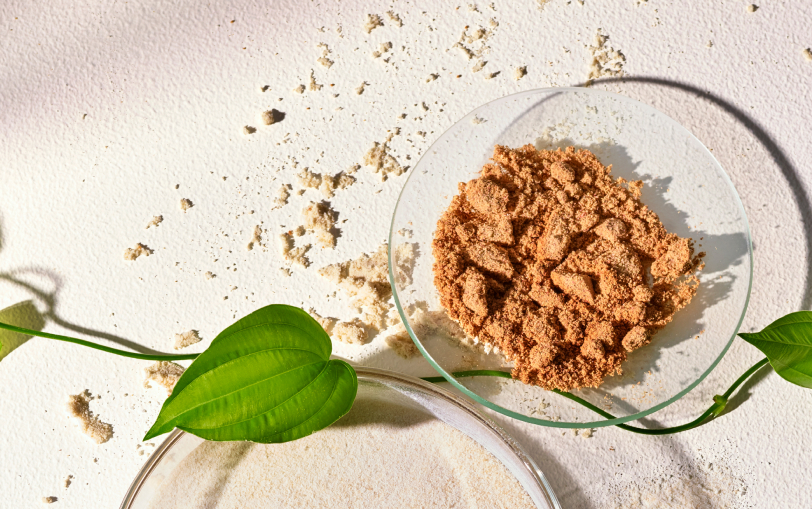nutrition
How to Choose The Best Turmeric Supplement
On This Page

Turmeric is a bright, yellow-orange spice that has been used for antioxidant properties and healthy immune responses.
Turmeric supplements are widely available, but the differences in products can include dosage, formulation, bioavailability, nutrient pairings, and more. In this article, we’ll discuss how turmeric works, possible health benefits, and what you need to know to choose the right supplement for you.
The Science Behind Turmeric Supplements
Researchers have been studying turmeric for many years. Curcumin, the bioactive ingredient that gives turmeric most of its impressive health benefits, has been considered supportive for many health conditions due to the way that it affects oxidative stress responses and immune cell signaling that in turn affect inflammation processes.
Curcumin seems to work by directly or indirectly interacting with different molecular targets in the body. These include enzymes, proteins, cell surface adhesion molecules, kinases, transcription factors, growth factors, and more.
Because of this mechanism, curcumin has shown varying levels of positive effects for:
- Joint and tissue comfort
- Healthy metabolic responses
- Immune system balance
- Healthy aging
- Mood balance
- Kidney health
Turmeric has many other likely benefits, and researchers are studying it for many purposes. Turmeric is not very bioavailable on its own, and the way that it is formulated strongly influences how well it is absorbed and put to use in the body. Because clinical trials may use different formulations and dosages, studies can return different levels of results and outcomes. Still, the beneficial properties of turmeric and curcumin are clear, but larger, standardized studies need to be done to clearly outline benefits and effects for specific conditions.
Health Benefits of Turmeric
Turmeric has many possible uses for wellness support. The benefits tend to fall under a few common categories.
Joint Support
Joints get a lot of use in the body, and as a natural part of aging, they can start to produce a daily level of discomfort. Joints can also cause issues after excessive exercise, athletic activity, and injuries. Health conditions and genetics can also determine a person’s level of joint comfort (or lack thereof).
Curcumin has been widely used to support comfort in tissues and joints. It has properties that help to balance the way that cells in the body can affect, stiffness, and redness, and studies show that it performs better than a placebo for these reasons. It’s helpful for natural aging and condition-related discomfort.
Digestive Health
While turmeric on its own does not absorb well, curcumin has been found to support a healthy intestinal barrier and mucosal lining. An 8-week double-blind, randomized, parallel-group clinical trial of 77 adults assessed how curcumin extract (500 mg daily) performed versus a placebo. The researchers were looking at impacts on self-reported digestive complaints. Curcumin outperformed a placebo by improving occasional abdominal comfort, indigestion, diarrhea, and constipation, as well as mood, but no changes to microbial gut composition were noted between the two groups. Curcumin was well-tolerated by participants and there were no adverse effects.
Curcumin has also been studied in other gastrointestinal conditions, with promising potential for abdominal comfort and quality of life. This research also noted no adverse effects, but larger studies are needed to confirm and replicate the results.
Heart Health
Many health concerns that arise as a natural part of aging are related to cellular oxidative responses, inflammation, and immune system function. Tissues and organs in the body, including the heart, respond to how cells function overall. Cellular health depends on access to nutrients and compounds that allow for cellular repair and energy metabolism.
Curcumin is associated with healthy free radical responses and may also support mitochondrial health. These are both foundational aspects to healthy cell function. More research is needed to make direct connections to how curcumin may affect heart health, but what we do know already shows promise.
Antioxidant effects
Curcumin has antioxidant properties that may protect cells from free radical damage. Every cell in the body is exposed to oxidative stress as a normal part of metabolism. How the body is able to respond can play a major role in healthy aging and longevity. Antioxidants tend to work together in the body to support and recycle the actions of other antioxidants, to support and elevate our overall ability to neutralize damage from free radicals. Curcumin can support total antioxidant capacity in the body, making it a nutrient of interest for many areas of ongoing research.
How to Choose the Right Turmeric Supplement
If you’ve decided to take turmeric, the many options available for purchase can be overwhelming. There are some things to keep in mind, however, that will simplify your process and help you end up with the product that’s right for you. Don’t forget: it’s important to work with your healthcare provider. Even though supplements are “over the counter,” they can still be powerful substances for health support, but they can also interact with medications or other dietary supplements.
What to look for in a turmeric supplement
Turmeric supplements come in many different dosages and formulations. As with any supplement, you will want to start by ensuring that it is free from ingredients that you may be sensitive or allergic to. You may also want to look for product information that includes details such as:
- Gluten-free, vegan, and free from GMOs
- Contains no unnecessary fillers
- Third-party tested
- GMP (good manufacturing practice) certification
The U.S. Food and Drug Administration has specific standards that supplement manufacturers must adhere to, but the burden is on those individual companies to comply. To solve this problem, many manufacturers are tested by independent third-parties as a way to verify quality in a transparent manner. There are several third-party testing companies, but some of the most commonly used are NSF International, U.S. Pharmacopeia, and ConsumerLab.
The Importance of Bioavailability in Turmeric Supplements
On its own, turmeric is not very bioavailable. The way a product is formulated can increase how the body is able to absorb and use it. There are a few ways that turmeric supplements are formulated. The most common additions to turmeric or curcumin include:
- Piperine: Sometimes listed as BioPerine, piperine is a bioactive component of black pepper that increases absorption.
- Liposome: Lecithin and other liposome formulations help to increase the absorption of curcumin, since it becomes more bioavailable in a lipid (fat-based) environment.
- Hydrophilic nanoparticles: By breaking curcumin down into nanoparticles, this formulation makes it possible for turmeric to be absorbed in water-soluble forms, increasing the overall bioavailability and benefits of curcumin.
- Micellar formulation: Micelles are chemical structures that work well to deliver fat-based compounds in a water-heavy environment (like the gastrointestinal tract). When curcumin is put into a micelle, it bonds with the hydrophobic core, and is enclosed in a hydrophilic shell that absorbs well in water. This formulation allows for better oral absorption, but has not been shown to demonstrate the same inflammation-related effects of other types of curcumin formulations.
- Phytosome: A type of phytolipid delivery system, phytosomes help to protect the fat-soluble curcuminoids and facilitate transport to the brush border of the small intestine, where they can help improve absorption and use in the body.
Curcumin vs. Turmeric
Bioavailability and how the body can use the supplement is the reason why the question of curcumin vs. turmeric is important.
- Turmeric is the whole-food plant
- Curcumin is the bioactive compound within turmeric
You would have to consume a lot of turmeric to ingest therapeutic amounts of curcumin, which is what gives turmeric much of its healthful properties. Supplements can be formulated in different ways. Some may list “turmeric” on the label, but you need to know how much curcumin is in the formula. If a label says “curcumin extract,” you can know that it contains 100% curcumin. If it says “turmeric root and turmeric extract,” it is less clear how much curcumin you are consuming per serving. Turmeric contains other beneficial nutrients, but typically supplement serving sizes are 1-2 capsules.
There are benefits to different types of turmeric supplements. Get a clear recommendation from your healthcare provider about which type is best for you.
Safety and Side Effects of Turmeric
Turmeric has a good safety profile when consumed in recommended serving sizes. Consuming it in excessive amounts can lead to medication interactions or negative side effects.
Possible side effects of turmeric or curcumin supplements may include:
- Constipation
- Indigestion
- Diarrhea
- Bloating
- Nausea and vomiting
If you experience discomfort while taking supplements, check with your medical provider.
While it’s not clear that turmeric supplements are harmful for pregnancy, there is not enough information to know for sure. Anyone who is pregnant or breastfeeding should work with their healthcare provider to determine whether turmeric or curcumin is safe for them. People who have any diagnosed conditions should also be cautious to check with their doctors before starting curcumin or other supplements.
Frequently Asked Questions About Turmeric
How much turmeric to take per day
Typical suggested daily intake for turmeric ranges from 500–2,000 mg. However, it’s challenging to standardize how much should be consumed, since the formulation greatly affects how much curcumin you get. A curcumin extract is typically 100% curcumin, while turmeric root could be a range, and may only include about 2–5% curcuminoids. For comparison, a one-half serving of turmeric powder that is used as a cooking spice contains approximately 35 mg of curcuminoids.
The reason you want to take curcumin or turmeric in the first place, along with the specific product that you have, makes it challenging to give a single answer for how much you need each day. Your healthcare provider can advise you specifically.
What does turmeric taste like?
Turmeric has a bold, earthy, peppery taste that many compare to the taste of curry. Turmeric is also a main ingredient in curry spice blends.
How long does it take for turmeric to work?
Turmeric works differently depending on the type of formulation, why you are taking it, and how well your body absorbs it.
- 6+ weeks for oxidative stress with intakes ranging from 80–1500 mg per day, with no significant effects at less than 6 weeks of intake
- 8 weeks for digestive health with intakes ranging between 500 mg per day
- 4-6 weeks for joint and tissue comfort with intakes ranging from 1000 mg per day
What does turmeric do for your skin?
Curcumin has been used for skin and dermatological health, both orally and topically. It has had some promising results for skin health, itching, redness, and more, but most study designs do not include adequate placebo comparisons and have other methodological issues that do not allow for a clear picture on direct effects. More research is needed.
Can turmeric cause diarrhea?
When consumed at recommended doses, turmeric is generally safe and well-tolerated. At higher intakes, or for people who may be sensitive, it can cause gastrointestinal symptoms, including diarrhea.
Will turmeric break a fast?
Turmeric does not contain fat, carbohydrates, or protein on its own, so it would not break a fast. Be sure to consider other ingredients in the product, or what you consume with turmeric, if you are fasting.
The Bottom Line
Turmeric is a potent herb with many potential benefits. Curcumin is the bioactive compound that is responsible for many of turmeric’s positive effects. There are many types of formulations and products, and choosing the right one for you comes down to several factors, including brand quality, formulation, dosage, and the reason you are taking it. Work with your medical provider to determine a turmeric supplement that is best for your health needs.



